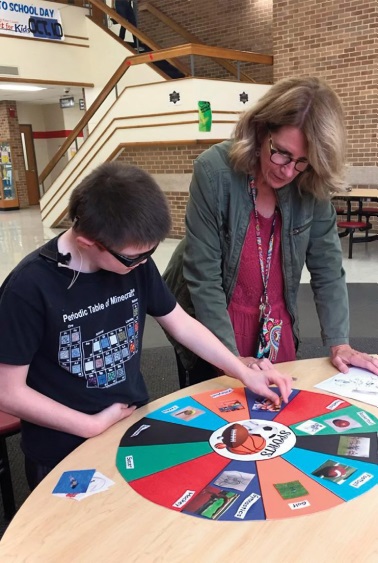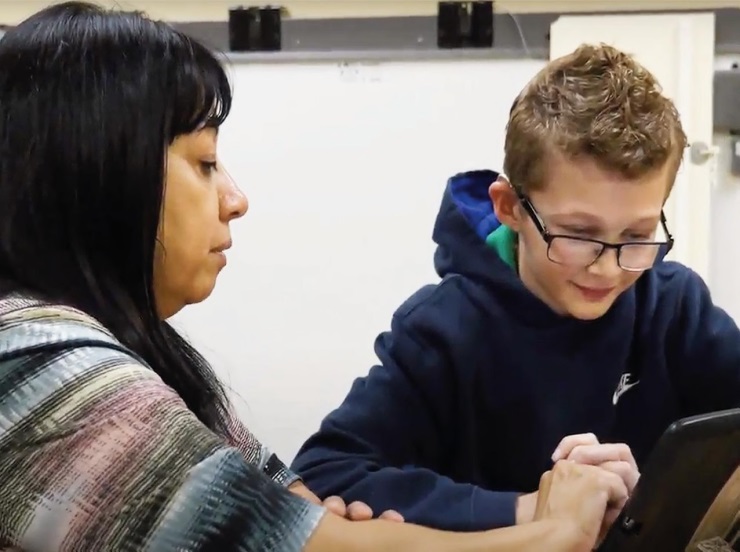

BRIDGING THE GAP: (Above left) A student works on a poster project with the help of a NICE-certified intervener; (Above right) An intervener and a student complete an assignment on a tablet. Many parents have shared how impactful it was for their child to have the services of a trained intervener.
Before examining whether intervener services are appropriate for your child, the IEP team must have an understanding of interveners and what they do. It is quite possible that your district and possibly your state, do not recognize interveners or have a familiarity with the position. Further, someone on the team must have expertise in deaf-blindness. If you are in a state that recognizes
TDBs, this professional, ideally, should be on the IEP team and/or provide consultation to the team, as should the intervener. However, only three states (Illinois, Texas, and Utah) recognize and provide endorsements for TDBs.
Lastly, in order to make an informed decision about intervener services, it's important that the team have comprehensive evaluation data, including data from individuals with expertise in deafblindness. Without meaningful information, it is difficult to identify the unique needs of a child who is deaf-blind and determine whether intervener services are appropriate.
Regardless of the extent of your child’s combined hearing and vision loss, take time to explore the appropriateness of intervener services, when considering what supports will be appropriate for your child and enhance the educational experience. •
References
Probst, K. M., & Morrow, S. M. (2019). Supporting individuals who are deaf-blind: Interpreters, interveners, and support service providers. https://rid.org/supporting-individuals-who-are-deafblind/
ABOUT THE AUTHOR:
Kristi Probst is the Initiative Lead for Interveners and Qualified Personnel for the National Center on Deaf-Blindness. Her undergraduate and graduate degrees focused on educating students with sensory disabilities (deaf/hard of hearing and visual impairment), and her doctoral studies concentrated on educating students who are deaf-blind. Her 10+ years of clinical, classroom, and early intervention experience working with individuals with disabilities have influenced her research and writing. Kristi regularly writes and speaks about meeting the needs of children with sensory disabilities and additional disabilities at local, national, and international conferences.
STRONG SUPPORTS : INTERVENER SERVICES
NATIONAL CENTER ON DEAF-BLINDNESS
Information and resources about TDBs and interveners
www.nationaldb.org/national-initiatives/iqp
The Open Hands, Open Access: Deaf-Blind Intervener Learning Modules were created to increase awareness, knowledge, and skills related to intervention for students who are deaf-blind and in educational settings. They are free and useful for anyone interested in learning about deaf-blindness and intervener services. nationaldb.org/products/modules/ohoa
OFFICE OF SPECIAL EDUCATION PROGRAMS LETTER
Provides informal guidance on the use of interveners as a related service. sites.ed.gov/idea/idea-files/osep-letter-aug-2-2018-letter-to-linda-mcdowell-ph-d